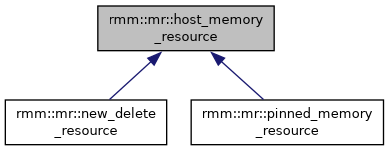Base class for host memory allocation. More...
#include <host_memory_resource.hpp>

Public Member Functions | |
| host_memory_resource (host_memory_resource const &)=default | |
| Default copy constructor. | |
| host_memory_resource (host_memory_resource &&) noexcept=default | |
| Default move constructor. | |
| host_memory_resource & | operator= (host_memory_resource const &)=default |
| Default copy assignment operator. More... | |
| host_memory_resource & | operator= (host_memory_resource &&) noexcept=default |
| Default move assignment operator. More... | |
| void * | allocate (std::size_t bytes, std::size_t alignment=alignof(std::max_align_t)) |
Allocates memory on the host of size at least bytes bytes. More... | |
| void | deallocate (void *ptr, std::size_t bytes, std::size_t alignment=alignof(std::max_align_t)) |
Deallocate memory pointed to by ptr. More... | |
| bool | is_equal (host_memory_resource const &other) const noexcept |
| Compare this resource to another. More... | |
| bool | operator== (host_memory_resource const &other) const noexcept |
| Comparison operator with another device_memory_resource. More... | |
| bool | operator!= (host_memory_resource const &other) const noexcept |
| Comparison operator with another device_memory_resource. More... | |
Friends | |
| void | get_property (host_memory_resource const &, cuda::mr::host_accessible) noexcept |
Enables the cuda::mr::host_accessible property. More... | |
Detailed Description
Base class for host memory allocation.
This is based on std::pmr::memory_resource: https://en.cppreference.com/w/cpp/memory/memory_resource
When C++17 is available for use in RMM, rmm::host_memory_resource should inherit from std::pmr::memory_resource.
This class serves as the interface that all host memory resource implementations must satisfy.
There are two private, pure virtual functions that all derived classes must implement: do_allocate and do_deallocate. Optionally, derived classes may also override is_equal. By default, is_equal simply performs an identity comparison.
The public, non-virtual functions allocate, deallocate, and is_equal simply call the private virtual functions. The reason for this is to allow implementing shared, default behavior in the base class. For example, the base class' allocate function may log every allocation, no matter what derived class implementation is used.
Member Function Documentation
◆ allocate()
|
inline |
Allocates memory on the host of size at least bytes bytes.
The returned storage is aligned to the specified alignment if supported, and to alignof(std::max_align_t) otherwise.
- Exceptions
-
std::bad_alloc When the requested bytesandalignmentcannot be allocated.
- Parameters
-
bytes The size of the allocation alignment Alignment of the allocation
- Returns
- void* Pointer to the newly allocated memory
◆ deallocate()
|
inline |
Deallocate memory pointed to by ptr.
ptr must have been returned by a prior call to allocate(bytes,alignment) on a host_memory_resource that compares equal to *this, and the storage it points to must not yet have been deallocated, otherwise behavior is undefined.
- Parameters
-
ptr Pointer to be deallocated bytes The size in bytes of the allocation. This must be equal to the value of bytesthat was passed to theallocatecall that returnedptr.alignment Alignment of the allocation. This must be equal to the value of alignmentthat was passed to theallocatecall that returnedptr.
◆ is_equal()
|
inlinenoexcept |
Compare this resource to another.
Two host_memory_resources compare equal if and only if memory allocated from one host_memory_resource can be deallocated from the other and vice versa.
By default, simply checks if *this and other refer to the same object, i.e., does not check if they are two objects of the same class.
- Parameters
-
other The other resource to compare to
- Returns
- true if the two resources are equivalent
◆ operator!=()
|
inlinenoexcept |
Comparison operator with another device_memory_resource.
- Parameters
-
other The other resource to compare to
- Returns
- false If the two resources are equivalent
- true If the two resources are not equivalent
◆ operator=() [1/2]
|
defaultnoexcept |
Default move assignment operator.
- Returns
- host_memory_resource& Reference to the assigned object
◆ operator=() [2/2]
|
default |
Default copy assignment operator.
- Returns
- host_memory_resource& Reference to the assigned object
◆ operator==()
|
inlinenoexcept |
Comparison operator with another device_memory_resource.
- Parameters
-
other The other resource to compare to
- Returns
- true If the two resources are equivalent
- false If the two resources are not equivalent
Friends And Related Function Documentation
◆ get_property
|
friend |
Enables the cuda::mr::host_accessible property.
This property declares that a host_memory_resource provides host accessible memory
The documentation for this class was generated from the following file: